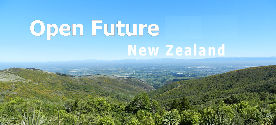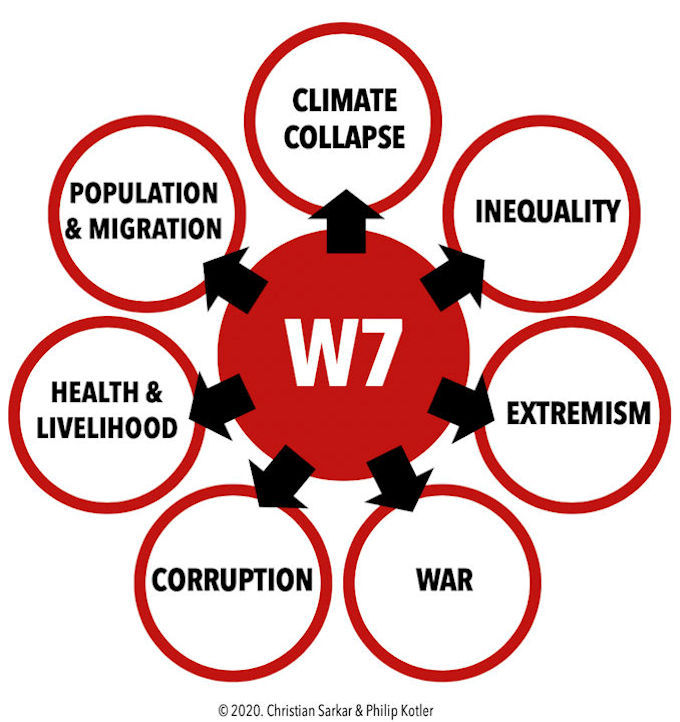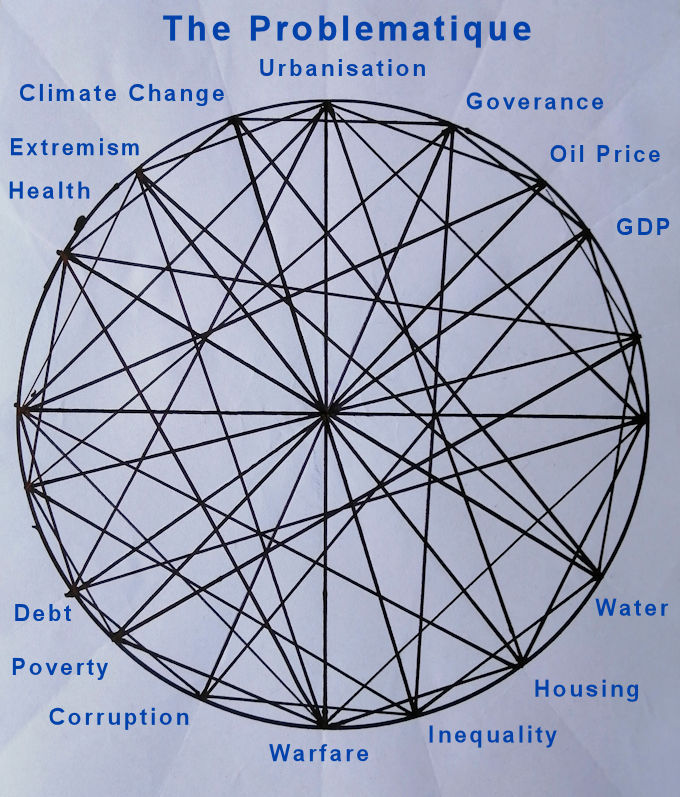
Open Future New Zealand
Resolving Wicked Problems
 Here are two alternative views of wicked problems. On the left a modern view. And below a graphic from 30 years ago. The point is that in a changing world where everything has flows, stores and feedback loops, no problem can be resolved in isolation. Trying to fix one problem can easily make another issue worse.
Here are two alternative views of wicked problems. On the left a modern view. And below a graphic from 30 years ago. The point is that in a changing world where everything has flows, stores and feedback loops, no problem can be resolved in isolation. Trying to fix one problem can easily make another issue worse.
On the left are the key issues chosen in 2020, by Sarkar and Kotler. Let's make it simple. The top five are all connected. They can't be resolved if the political powers in a country choose not to take the problems seriously. This is not the view, an educated person like me, is supposed to support. The political will to resolve these problems doesn't exist. Let's stop pretending.
There are hundreds of interconnected "problems" and none of them can be solved with the present methods or with our present understanding of cause and effect. If key political and economic institutions are making money and gaining power from the current situation, then change led from top is not going to happen.

Frequently the people in power choose to use their position to improve personal, institutional or tribal wealth. Corruption, terrorism, warfare and grand theft, are commonly tools of government too, not just criminals and "terrorists".
In trying to write anything sensible and understandable about wicked problems I found myself quickly buried in a morass of issues, writing many pages and getting nowhere. Why? I've decided that while climate change, the Covid-19 pandemic, terrorism and civil war top the list of current "problems," they can't be resolved because seemingly less important issues like inequality and inability to earn a living, remain unresolved.
I now see, that some ten years ago, when the concept of an "Open Future," was an ideal that seemed achievable, I was excessively optimistic. I assumed that despite our differences people could and would unite, to save the Earth they know, and to protect humanity. I now doubt that we have the political will to do that. I had hoped that international co-operation, the building of consent, the making of new rules and better laws, and the goodwill of governments and institutions would prevail. I don't see that now. Rather we seem determined to do battle.
The Good Actors View
Mainstream media promote a view that I once hoped could be enacted. Surely, both people and their governments want to do the right thing. We tried to master nature, to take control and turn everything to our own advantage. We hoped to live long increasingly prosperous lives. We didn't understand what we were doing, that Earth's resources are limited, that population growth at some stage will be stopped. There are many limiting forces controlling our possible future outcomes.
There is a price for our failure to understand the limits of our powers. Many of these adverse consequences we can now predict, all of them creating massive disruption to human life on Earth. More frequent storms, floods and droughts, creating a loss of property, declining income, food supply issues, drinking water shortages, and the mass migration of millions of people. Water issues and loss of agricultural viability are already causing civil war (Syria) and regional disputes (North Africa). Social, Economic and political disruption will become more widespread.
If we are the good actors we claim to be, what we have broken can be fixed. Or have we denied reality for so long that remediation is not now possible?.
The Bad Actors View
Shakespeare was aware that "power corrupts" and if you look at social and political history you can see the power of small groups, essentially a "family" or tribe; people with close ties to each other. Think about the Court of English Monarch, Henry the Eighth. It helped to know the king and those close to him, but the rule of law was weak, except for the orders of the King. Surely, that would be unacceptable today!
Except in too many countries of the world, the nation state is still run in very much that way. Even in countries that claim to be "democratic," small groups, often family, often with links into the police, the legal profession and the military, become so powerful that they rule, with impunity, for decades.
Thanks to the Internet and to 24 hour news coverage, in many countries of the world, the fragility of the law, the connection between political power, the military, security services, the police and business, is often exposed. Bad actors often use political power to steal the resources of a country for their own ends. Sometimes terrorist groups or a drug cartel, do the stealing. There is political support somewhere, connection with the mainstream, that enables police corruption, rebel army's, drug cartels, over fishing, illegal mining, people smuggling, slavery, or piracy as examples. "Criminal" activities are sustained by, money laundering via casino's, or property deals, or false invoicing, which lawyers, banks and politicians facilitate. Do they turn a blind eye, or do they encourage this activity? That probably depends on how secure they are about future revelations.
In the world as it is, Russia, or China, or even the USA, will use the power of veto in the Security Council to protect governments they favour against criticism. All three have supported dictators, and military governments around the world, when it "protects their interests." There is lip service to democracy and human rights, in favour of political and economic advantage.
The Club of Rome

The Club of Rome was established to focus on "The Problématique", the wicked problems that seemed to refuse all efforts at solution; perhaps they are impossible problems. In the thinking of the time (1968) the best way forward was to for a group of high powered politicians, scientists philosophers and diplomats, often recently retired; to study the issue. (They have already tried to work on these issues and failed. Many believe that such experience shouldn't be wasted in retirement.) There is an assumption here that the leaders of the world are "Good Actors," and that top down decision making is both essential and likely to be effective.
The Club of Rome commissioned MIT to attempt to model the world system, and to predict the future for some of the key variables. Three years later (1972) the book "Limits to Growth" was published.
"Limits to Growth" was strongly criticised, especially by economists. However in 2008, Graham Turner of the CSIRO in Australia found that 30 years later the actual historical data compared very well with the business as usual scenario predicted by "Limits to Growth".
The Club of Rome has worked with the United Nations in constructing the global objectives to eliminate hunger, poverty and infectious diseases. The original plan was Agenda 21, which is generally considered a success. The latest plan is ![]() "Transforming our world: the 2030 Agenda for Sustainable Development," and it's a challenge to us all.
"Transforming our world: the 2030 Agenda for Sustainable Development," and it's a challenge to us all.
There is often deep resentment to Agenda 21 or the new Agenda 2030, in the USA, on the assumption that it's the United Nations trying to constrain American economic and political power. That's not helpful, but Russia, China, and India, just to name three, have other agendas too.
The Club of Rome is still active. ![]() "The Climate Emergency Plan of the Club of Rome," was launched on December 4th 2018 at the European Parliament. They called on governments across the world to declare a "Climate Emergency", and provided a plan of action. In March 2019 they issued an official statement in support of Greta Thunberg.
"The Climate Emergency Plan of the Club of Rome," was launched on December 4th 2018 at the European Parliament. They called on governments across the world to declare a "Climate Emergency", and provided a plan of action. In March 2019 they issued an official statement in support of Greta Thunberg.
In response to the current global issues, they offered another plan for the ![]() "Planetary Emergency," (September 2019).
"Planetary Emergency," (September 2019).
That was before the Covid-19 Pandemic, and the plan was updated, to include the Covid-19 pandemic, it's opportunities and threats, in August 2020.
Inequality : Livelihood : Welfare Failure : Voting Power : Health : Housing
This cluster of problems are at the heart of humanities failure.
There are always people who will be poor, yes, but when a society neglects social welfare, when inequality in education, income, housing and health care is significant, people cannot play their proper role as citizens. In some countries religious of ethnic mistrust may cause inequality. The treatment of women and girls is commonly discriminatory. In addition economic and social exclusion probably means people are unlikely to vote. Of course in many countries the vote is rigged anyway. The elite take what they want, and the general population do the best they can.
Ask yourself; is the country really democratic, or is political power controlled by a small group of people.
I will argue that in Russia, China, India, and the USA, the existing political and economic elite, pretend to be democratic. Being democratic is hard, it constrains what a government can do. It gives some power to people who are not "elite." The founding fathers in the USA were very specific about that. They were determined that the USA would be controlled by white landowners, people like themselves. They have largely been successful. The real interest of those in power is political strength. Look at the use of the veto in the Security Council, to see what really matters to the big five.
